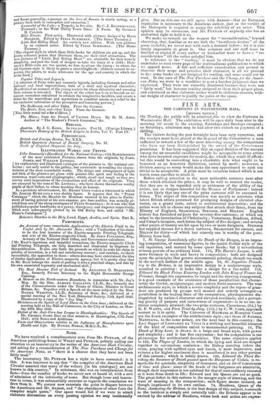Now.
We have received a complimentary note from Mr. PUTNAM, of the American publishing-house of WILEY and PUTNAM, politely calling our attention to an inaccuracy in the notice of the American Book Circular, and asking for a reconsideration of The New Purchase and Change for the American Notes, as " there is a chance that they have not been fairly read." The inaccuracy Mr. PUTNAM has a right to have corrected: it is this. It was incorrect to say that " the compiler of the American Book Circular asserted that many of the writers [in his catalogue] are not known in this country." In strictness, this was an interpretation from facts—from the number of books we never saw or heard of, with a sort of admission of the inferiority of some. But though loose and inaccu- rate in terms, it was substantially accurate as regards the conclusion we drew from it. We cannot now entertain the point in dispute between the Americans and Mr. ALISON, and " the abundance of other facts the compiler might quote." Our space would fail if we were to admit elaborate discussions on every passing opinion we may incidentally give. But on this one we still agree with Aissox—that an European reputation is necessary to the American author, just as the verdict of the Metropolis is required to stamp the celebrity of an actor. This opinion may be erroneous, and Mr. PUTNAM or anybody else has an undoubted right to hold it so. We make no remark on the request for " reconsideration," beyond observing, that, familiar as we are with the "inordinate desires" of the genus irritabile, we never met with such a demand before ; for it is evi- dently impossible to grant it. Our columns and our staff must be doubled or tripled if every author or bookseller were to have a " re- consideration " till the notice satisfied him.
In reference to the " reading," it must be obvious that we do not undertake to read every page of the multitudinous publications to which we append notes. A fair and sufficient examination and perusal to discover their scope and perceive their character, is all we pretend to do : some books are not designed for reading, and some could not be read. In the case of The New Purchase and the Change for the Ameri- can Notes, we were in a condition to pass a harsher judgment than we expressed. They were not cursorily dismissed because they were not " fairly read," but because reading assigned to them their proper place, and convinced us that elaborate notice would be elaborate censure, with- out weight of character to justify the pains or the space.


























 Previous page
Previous page